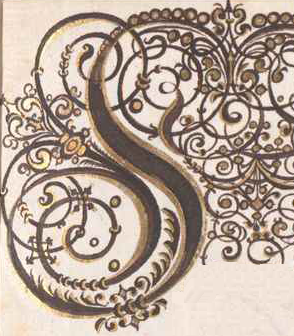Improvisatieles van Thomas De Sancta Maria
On the use of composed music in learning improvisation
By Thomas de Sancta Maria in Libro llamado, Arte de taner Fantasia (Valladolid, 1565)
“A wise man has said that the stone is not carved out by the water drop that falls one time or two, but continuously.”
If one is to derive benefit from the [composed] works he may perform, five things must be kept in mind. The first is to comprehend in a fundamental way the invention and artifice of the fugal entries, and likewise how the voices answer each other, that is, whether the voices imitate and correspond at the 4th, 5th, octave, or some other manner in these entries, and whether they are played in two, three, or four voices, and further, whether or not they proceed in strict imitation. In all these things consists the art of fantasy, and [art] is what one must keep in mind above all else; for in all things art alone is what makes the master, and it follows from this that all those who are ignorant of art in the pursuit of their callings are deficient.
The second thing is to note the entrance of each voice, that is, whether it enters before, during, or after a cadence, or whether it enters without a cadence, or with what design or purpose it enters; for the entrance of each voice is the thing most exquisite, and of the greatest beauty and artistry of anything in music, and therefore one must give it the greatest attention and care in order to learn it from [composed] works.
The third thing is to note all the kinds of cadences used in the pieces, to understand them completely, and to hold them in memory in order to use similar ones in the [improvised] fantasy.
The fourth thing is to note all the consonances and dissonances that occur in the pieces, those that occur in two [voices] as well as in three and four, and at the same time to study the whole melodic line of each voice and to note the consonances formed by it. And observe also what melodic progressions are pleasing in each voice, and commit these thoroughly to memory in order to form various fugal subjects from them, for this is of great benefit toward achieving richness and abundance in the fantasy.
The fifth thing is that when a subject is imitated, to note the variety that may be achieved in these imitations of the subject, and also observe if the imitation is by two, three, or four voices.
In order for beginners to progress in the fantasy, they must practice repeatedly with the subjects they know, so that through usage art is made a habit, and thereby they will easily play other subjects. It is also a very useful thing to transpose the same subject to all the pitch signs on which it can be formed, but with the warning that wherever it is transposed it must retain the same melodic line.
So that all the foregoing may be fruitful and beneficial in the fantasy, one must practice it many times each day with great perseverance, never losing confidence but holding to the certainty that continual work and practice will prevail in all things and make the master, as experience shows us at every step. And therefore a wise man has said that the stone is not carved out by the water drop that falls one time or two, but continuously.
Translation by Almonte C. Howell and Warren E. Hultberg (Pittsburgh, 1991)
———
